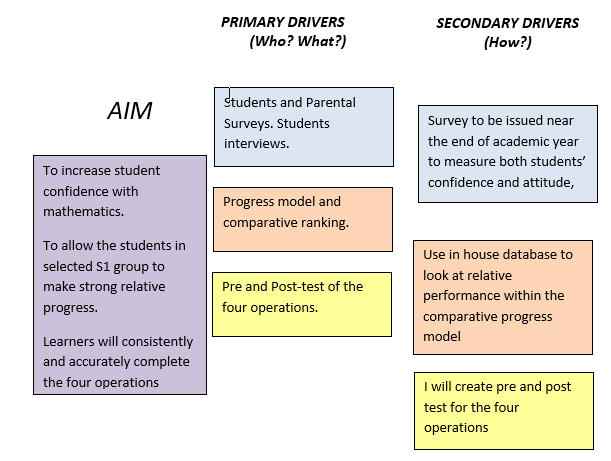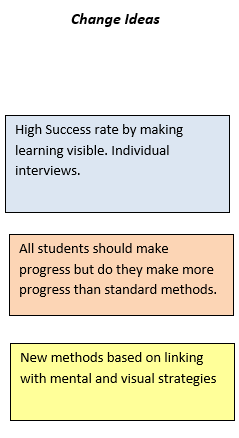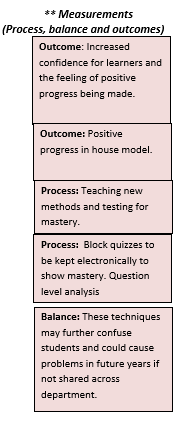


this diagram is be meant to be on one level but couldn’t manage the image quality the way I wanted. I did try 🙂



this diagram is be meant to be on one level but couldn’t manage the image quality the way I wanted. I did try 🙂
I have decided to focus in on the area in alternative methods of teaching standard algorithms to link in better with physical and mental models.
I think the research in this field is under explored, Most teachers , teach the same way they have been taught.
This is a form of evidence that these methods are effective , the lindy effect is suggest that ideas last for a reason.
The group I will focus are group of s1 learners , the reason this will be focus is that standard methods have failed with this group. After 7 years of primary education these 15 students cannot number bond within 10 and cannot complete the standard computations with any accuracy. This limits their chances in maths , across the curriculum and in future life. So a new method maybe worth a go.
My Enquiry Question
” How do alternative approaches to teaching the four operations effect learners mathematical confidence and ability to perform said operations consistently and accurately”
I have been looking into both aspects of my inquiry focus for some time so much so this latest blog is a month late ( sorry BigBrother maybe BigSister), it’s been busy.
In one sense my exploration was fruitless, after much toiling in the field to find the effectiveness of different approaches to teaching standard computations my harvest returned barren and villagers are in for a famine. Many of the different approaches I have been trying, come from 2 different sources, Professor Arthur Benjamin who has written a series of books https://www.amazon.co.uk/Secrets-Mental-Math-Mathemagicians-Calculation/dp/0307338401/ref=sr_1_1?keywords=arthur+benjamin&qid=1573195097&sr=8-1
and Professor James D.Tanton
In these books and video lectures, they offer a series of alternative teaching methodologies, making arguments from the theory of multiple representation and links with mental calculations but I have yet to find the paper with a comparative study.
Jo Morgon is soon to publish a book on the use of different approaches (https://www.amazon.co.uk/dp/1912906600/?coliid=I2C8H7H393BK8Q&colid=13VVNRXI8UQ9Y&psc=1&ref_=lv_ov_lig_dp_it
I will read this with great interest.
Memory and Spacing
In my other area of interest changing the balance of lessons to review, the harvest was bountiful.
” Our data, to stress the point, suggests that three complete sets of complete information interpreted and integrated into working memory, are the minimum needed for the construction of a new belief or concept”
Graham Nuthall , 2007
In my experience, the word minimum is vital in this sentence. With students with the poorest prior attainment needing more in the region 5 or 6 exposures spaced over time.
Direct Instruction the most successful program in Project follow through follows this 20% new to 80% review allocation.
” In this structure, lessons are shaped around multiple skills or topics rather than around a single skill or topic and each of these skills/topics is attended to for a short segment of time (five to ten minutes) and revisited over several days until these discrete skills/topics are mastered”
Explicit and Direct Instruction, Adam Boxer, 2019.
I’m looking forward to further exploring my practice in these areas, they are potential benefits in both but also areas where I can see problems arising.
After watching the lecture series ” The Power of Mathematical Visulasisatioin ” by Professor James Tanton

( side note the great course has loads of brilliant maths courses).
I have been inspired to alter the way I teach the four operations, linking with a visual model of teaching.
Addition

As with all new methods, I am working left to right. This links well to how you would use dienes blocks and mental methods. It has the added benefit of making adding in alternative bases simpler.
Subtraction

Again left to right and gives a better feel in terms of number awareness, the students are constantly reinforcing place value.
Multiplication

Links well to physical resources and links well with multiplying brackets (5x + 6)(4x+3) = 20x^2 + 39x +18. Here the students can start to spot the relationships.
Division

I have made the choice to leave the final answer in mixed fraction form, again to link with a manipulative and further algebraic division. Later on, I will explore the link between fractions and decimals.
I hope to test these methods with my 9th set s1 class. These students have had exposure to standard methods and failed. I will hope to show that these methods will allow the students to acquire the knowledge to complete basic calculations and develop a greater conceptual understanding.
Memory
The second drive I wish to explore is the link between memory and forgetting.
In his recent book “Teaching for Mastery” Mark McCourt recommend an 80%-20% split in the review of each lesson and the teaching of novel content, this point was also made by Siegfried Engleman in his book ” Successful and Confident Students with Direct Instruction”.
Both authors make similar justifications that content has to be embedded throughout time, revisited after forgetting and moved in with a phased approach from direct teacher instruction to independent practice /behaviour. This is an idea I think has the power to improve understanding and retention for all pupils.
I will adjust the ratio of my lessons to have 80% review, 20% or so independent practice/ behaviour of material spiralled in the curriculum, guided practice through the use of mini-whiteboards of recently learned material (interleaved) 60% and then 20% novel idea teaching with a heavy focus on direct instruction. I hope this change will improve retention and far transfer.
I recently reviewed “Reforming Scotland Future: What future for Scottish Education”. The main suggested reforms from the author where
3. Technology is transforming education argument, this argument can be found in books of 19th-century philosophers. I have yet to read a study in which the use of technology in the classroom has significantly improved leaning. The mere presence of a mobile phone in the classroom led to 20% reduction in attention, concentration and performance ( Thorton 2014 Social Psychology) Schools that banned mobile phones received a 6.4% increase in their exam results going up to 14% for the previous lowest-achieving ( Beland and Murphy 2015). “laptops use can negatively affect performance on educational assessments , even or perhaps especially – when the computer is used for its intended function of easier note-taking” (Muller and Oppenheimer, 2014).
To transform Scottish education and close the achievement gap we need to focus on the areas that have been shown to work time and time again. Teaching for long term memory, spacing, interleaving retrieval, a strong knowledge-based coherent curriculum with a focus on mastery at each step, firm and loving discipline.
We should invest in teachers and in CPD, scrap failing skills-based curriculums and invite our poorest children to share in rich knowledge-based culture, giving them opportunities and life chances currently reserved only for they’re well off piers.

Activity today at teacher leadership . Check. out my excellent drawing skills. I have also but the picture in at wrong angle to create a desirable difficulty. 🙂
Students performance in maths ( and all other measures) have been steadily declining in Scotland.
Below are PISA scores from the Scottish Gov Website.

A steady decline .
(We will see in December 2019 if this trends reverses , don’t hold your breath.)
Another graph based on country comparisons. We can see a massive decline since 2003, the worst in the UK

The now scraped SSLN data


What has happened ? Is it a problem with our general society ? Why then have we declined in comparison to England.
The problem must surely lie with our school system. I will expand on this conclusion in future posts.
(I have focused on maths in this post but the same results are replicated for literacy levels. )
I stumbled upon Will Emeny’s website a few years ago and have always been impressed with his clarity of thought . It was Will that started me on my path into the research of memory. Thanks Will for this and for Num Ninja’s , still having a high impact on my classes for years ( completely free of charge).
He recently had another great idea a periodic table of teaching , I have been following weekly for updates but instead I thought I would use his idea to help create my own version. Not as good as Will’s will eventually be but a start.
Follow the link below to see my fledgling attempt.
![]()
Glow Blogs uses cookies to enhance your experience on our service. By using this service or closing this message you consent to our use of those cookies. Please read our Cookie Policy.